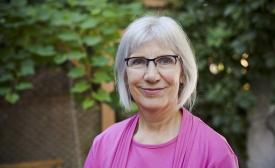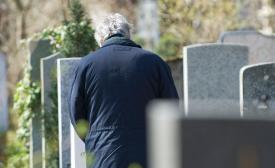Facing death, rethinking life
I find myself in the middle of living and I am faced with death. Although it was expected, I was still surprised when a friend of mine died earlier this year.
I find myself in the middle of living and I am faced with death. Although it was expected, I was still surprised when a friend of mine died earlier this year.
When Kari Miller tells people her major in university, they either look uncomfortable and walk away, or begin sharing deeply personal stories. That’s because she studied thanatology—the study of death.
By everything that is right and good, Helen Penner's life should have been celebrated with singing.

'People want to come out and show their compassion.' (Image by carolynabooth/Pixabay)
Does this sound familiar?
“At George’s request, cremation has taken place. There will be no funeral home visitation or service. As expressions of sympathy, donations to the Princess Margaret Cancer Centre would be appreciated.”
“At Jenny’s request, there will be no funeral home visitation. A family service will take place.”

“I wondered if pacifist Christians, who hold a strong commitment to preserving life, had the capacity to consider the possible merits, even mercy, in assisting someone to die. I wondered about how a theology of suffering, redemptive suffering even, so basic to Christianity, would inform the choices we make.”—Melissa Miller
In June 2016, the government of Canada enacted legislation that enabled eligible adults to seek medical assistance in dying (MAID). At the time, I followed some of the debate with many questions and a mixture of hope and dread. My questions included the incongruity of lodging the matter with healthcare professionals, who are committed to saving and serving life.
“In the midst of life, we are surrounded by death.” These words are often spoken by a pastor during a graveside service at which loved ones gather to bury the deceased. They are taken from the Mennonite Church’s Minister’s Manual. When I first read them as a new pastor, I was startled by their sharp contrast. Now I often ponder how true it is.
I love doing funerals. As a young pastor, I now have nine under my belt. It seems I enjoy them more with each one. To be honest, I haven’t had any difficult funerals to do yet. No tragic circumstances or painful dynamics to deal with. Each one being a dear old saint, ready to be united with Christ in the heavens.
Almost 13 years ago my family said our final goodbye to my mother. Grace Magdalene Bender Schwartzentruber lived a full life on two continents, always actively participating in her extended family, church and larger community. I once observed that she and my dad “collected” friends everywhere they went. Our family’s dining room table always had room for guests, planned for or unexpected.
“It was here somewhere,” I said to my son Allan. “The Boese canning factory was over here, and over there was an orchard where we lived in our trailer until about 1962. It was near the dormitory for the workers. At least I think. I should ask Dad.” (Dad was Peter Rogalsky. He and Leona [Unger] Rogalsky, my mom, had both worked for Boese in the late 1950s and early ’60s.)

September has been a whirlwind of change. It always is. One day we’re enjoying the lazy days of summer, when our mornings are spent park-hopping, lunches are always picnics, and supper is usually topped off with bicycle rides and ice cream cones. Bedtime is flexible, shoes are optional, and everyone goes to bed with dirt and sand under their fingernails.
And then September comes around and BAM! Everything changes. Preschool starts. Work resumes. Alarm clocks are set and bedtime is enforced. Sometimes if feels like life does a full 180 in September.

‘End-of-life decisions will be more complicated as time goes on. It will be necessary for the church community to be aware of the complexity of cases and to seek to find appropriate Christians responses to them.’ (Marianne Mellinger)
When Susan Griffiths of Winnipeg went to Switzerland a year ago to die by doctor-assisted suicide, it was headline news and re-ignited the debate around end-of-life issues. Responses to her death revealed that we are living in a time of shifting public sentiment when it comes to end-of-life issues, especially concerning euthanasia and assisted suicide.
This Easter is going to be different.
I probably sound hypocritical stating how uncomfortable I am talking about death in one post and then writing about that very topic in another post. I didn’t plan on talking about it anymore, but lately, it’s all we’ve been talking about.
On Sunday, Boo came out of her Sunday school class proudly holding a colorful beaded cross. “It’s a cross,” she stated proudly. And then her whole face and demeanour changed. “Jesus died here. I am so sad. Jesus died. Why did Jesus have to die?”

At this moment, I am sitting in the warmth of a sunbeam, sipping a cup of tea, and enjoying a quiet afternoon while both my girls nap. What a glorious moment. Or, at least it would be, except for the dead ladybug sitting in a jar on the windowsill next to me.
It’s springtime. Dead bugs are a common presence around here. But this bug is different. For starters, she has a name. Odette. And she is loved dearly by my eldest daughter, Boo.